As 2023 saw the first wave of AI applications gain traction in areas like conversational AI, writing, and coding copilots, many are saying AI agents are the next big thing in the industry.
AI agents refer to systems that can solve tasks by planning, prioritizing, reasoning, and autonomously take actions to achieve their goal.
While several AI agents exploded in popularity, for example AutoGPT became the fastest growing open source project in history...the reality was these early agents weren't all that reliable and quite experimental. That said, many startups are working to solve those early challenges and gain early market share.
As Aura VC highlights, there are several stages in AI agent development, including:
- AI copilots: Humans are in the loop, i.e. they provide feedback and work alongside AI copilots.
- Autonomous AI agents: Agents solves tasks autonomously with humans as supervisors.
- AI agent fleets: Create swarms of specialized autonomous AI agents that interact with each other to solve increasingly complex tasks.
As these agents get more and more sophisticated, it seems quite likely that large parts of a business could be managed by AI agent fleets...so you can see why there's so much hype around them.

Aura VC also highlights the growth rate of the AI agent market over the next 5 years is:
...estimated to grow from USD 5B in 2023 to USD 29B by 2028, at a CAGR of 43%.
In this guide, we'll look at the top AI agent startups to watch, including what they do, VC funding, and more.
Stay up to date with AI
AutoGPT
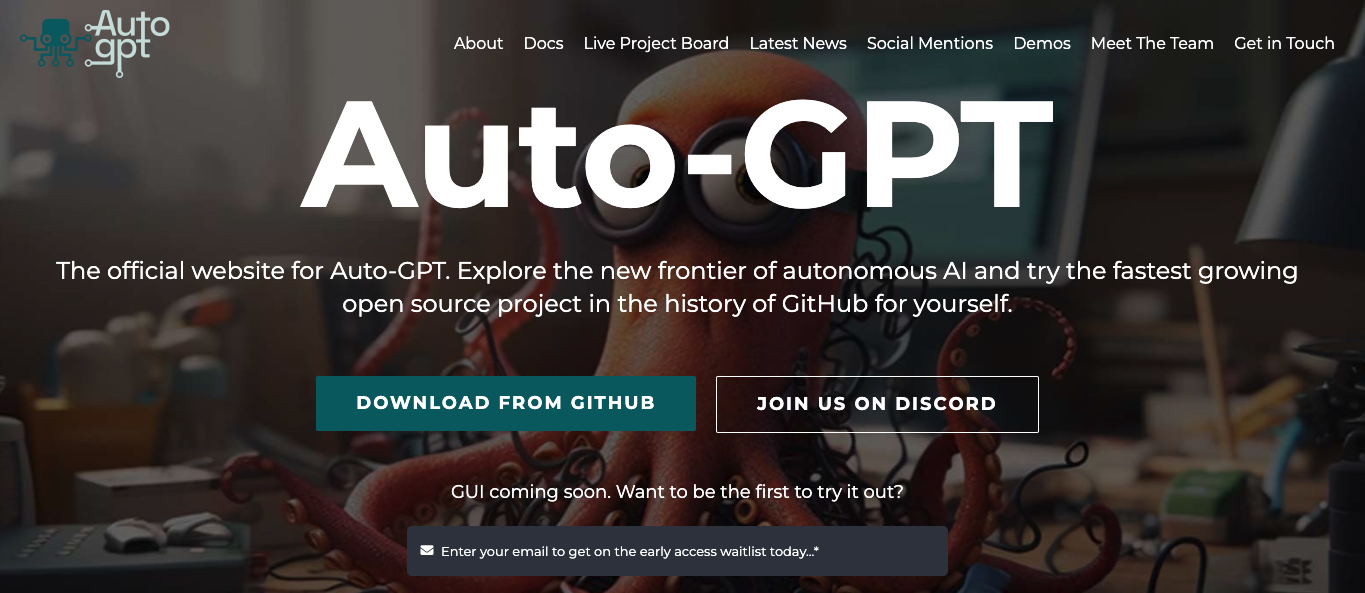
AutoGPT is an experimental open-source application showcasing the capabilities of modern Large Language Models. This program, driven by GPT-4, chains together LLM "thoughts", to autonomously achieve whatever goal you set.
As mentioned, AutoGPT was the fastest growing GitHub project in history. While the excitement did wear off quite a bit, the company has now gone on to raise $12 million in funding to take their open source project to the next level. From their official website, we can see that a GUI for AutoGPT is coming soon, so we'll be keeping a close eye on that.
Relevance AI
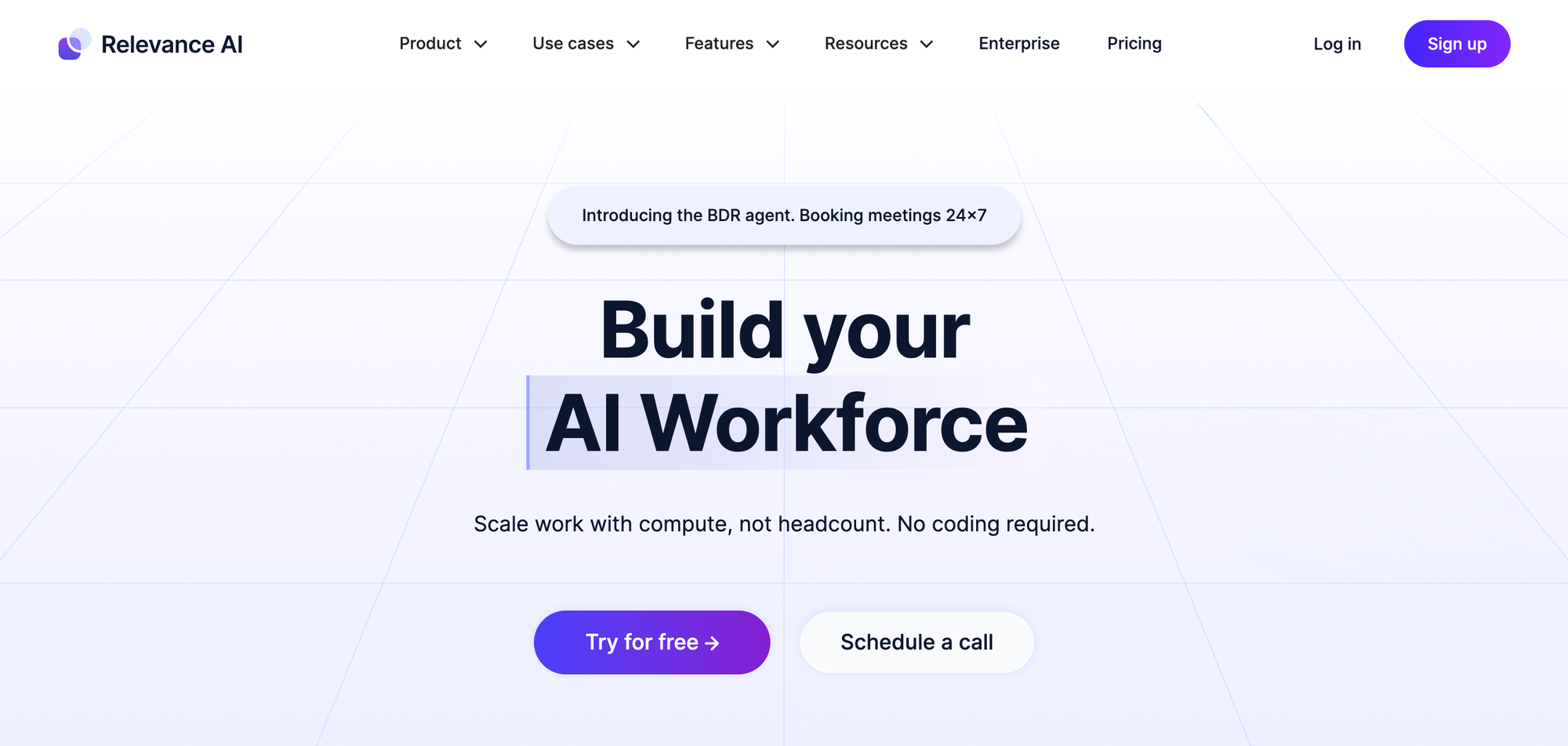
Relevance AI is another no-code AI agent builder that defines itself as:
the leading platform trusted by Fortune 500s and fast growing startups to create custom AI apps and agents in minutes, no coding required.
Here are some of the key use cases of Relevance AI’s platform:
- Allows you to train agents with natural language and onboard them as your co-worker
- Distill expertise into AI Tools with a no-code builder
- Connect with other systems
- Orchestrate and delegate across many agents
- Monitor and manage output of tasks
Relevance AI has raised a total of $18M in funding over 2 rounds, with their latest funding being a Series A round of $10M led by Insight Partners with participation from Galileo Ventures and Archangel Ventures.
LangChain
LangChain is another startup that began as one of the fastest growing GitHub projects and has now gone on to raise $10 million in funding from Benchmark.
LangChain describes itself as as a platform to
.Build context-aware, reasoning applications with LangChain’s flexible abstractions and AI-first toolkit.
LangChain’s platform offers support for various model types, prompt management, memory, indexing, chains, and agents to help developers build LLM-focused applications.
We've written several tutorials on getting started with LangChain, which you can find below:

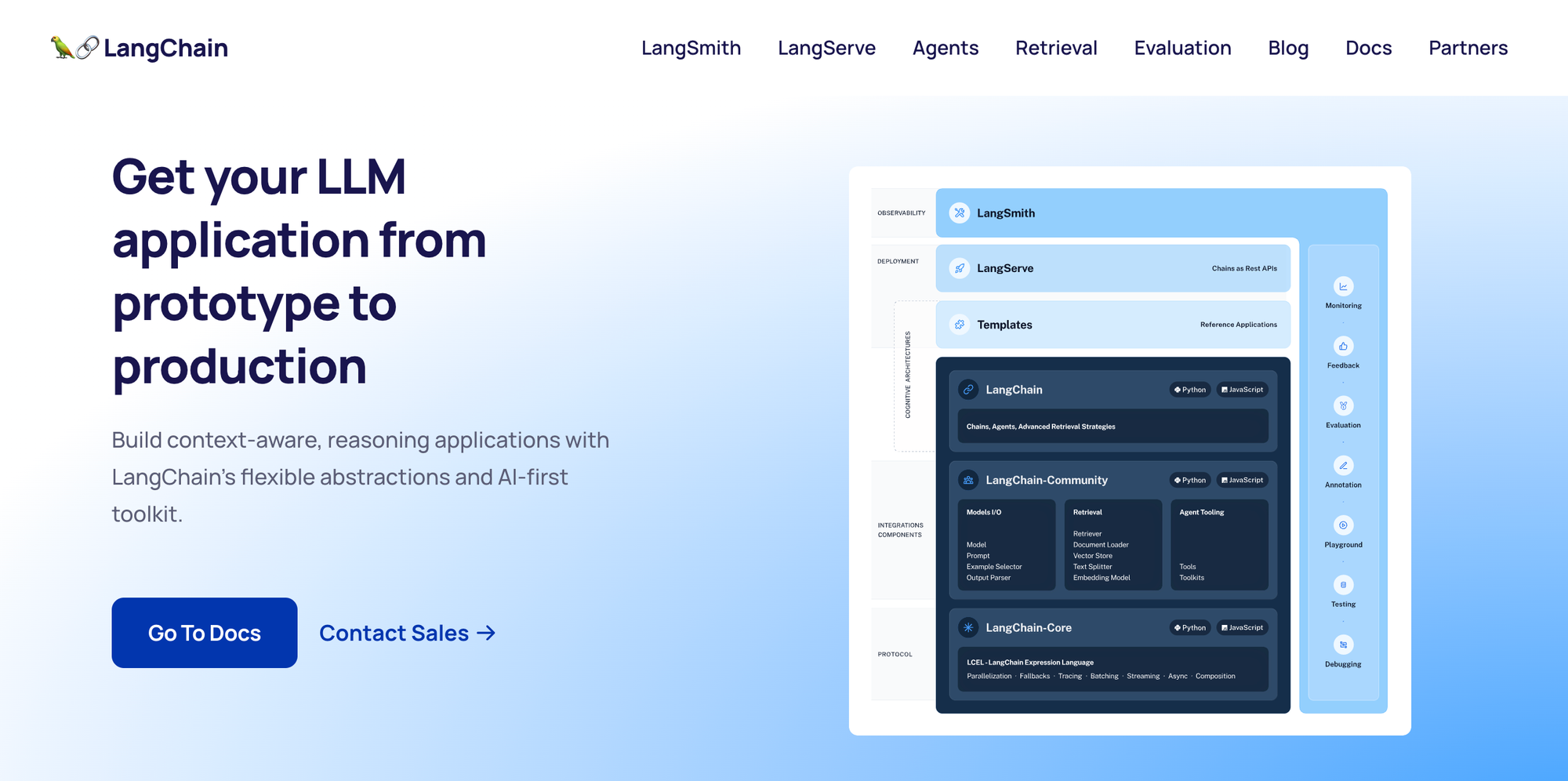
Cohere

Cohere is an enterprise-focused AI startup that provides a suite of natural language processing (NLP) tools, including an LLM tookkit for building conversation agents. Cohere's suite of tools includes:
- The Command model, which is used to power conversational agents, content summarization, and copywriting.
- Its Retrieval Augmented Generation (RAG) toolkit enhances the Command model's capabilities, enabling it to generate accurate responses using enterprise data.
- Coral allows the creation of chatbots and knowledge assistants using RAG for data-driven, precise conversations.
- Cohere's Embed model allows for semantic search with its embedding models, applicable in over 100 languages.
- The Rerank tool complements this by improving the relevance of search results in existing search systems.
Cohere's vision extends to developing AI agents capable of performing tasks autonomously. The company has raised a total of $445 million, with a recent Series C funding round bringing its valuation over $2.1 billion.
Second
Second is another developer-focused startup that automates codebase migrations and upgrades for developers using AI agents. The platform is capable of generating pull requests, and it can be connected to a GitHub repository.
Second’s AI agents are controlled by hand-crafted, purpose-built modules that are engineered for specific code migrations, eliminating prompt drift common with generic AI agents.
A few of the key use cases of Second’s platform include:
- Automated code migrations: Second’s platform automates codebase migrations and upgrades for developers using AI agents.
- Pull request generation: Second’s platform is capable of generating pull requests, and it can be connected to a GitHub repository.
- Customizable AI agents: Second’s AI agents are controlled by hand-crafted, purpose-built modules that are engineered for specific code migrations, eliminating prompt drift common with generic AI agents.
The company has raised $500k pre-seed round in venture funding.
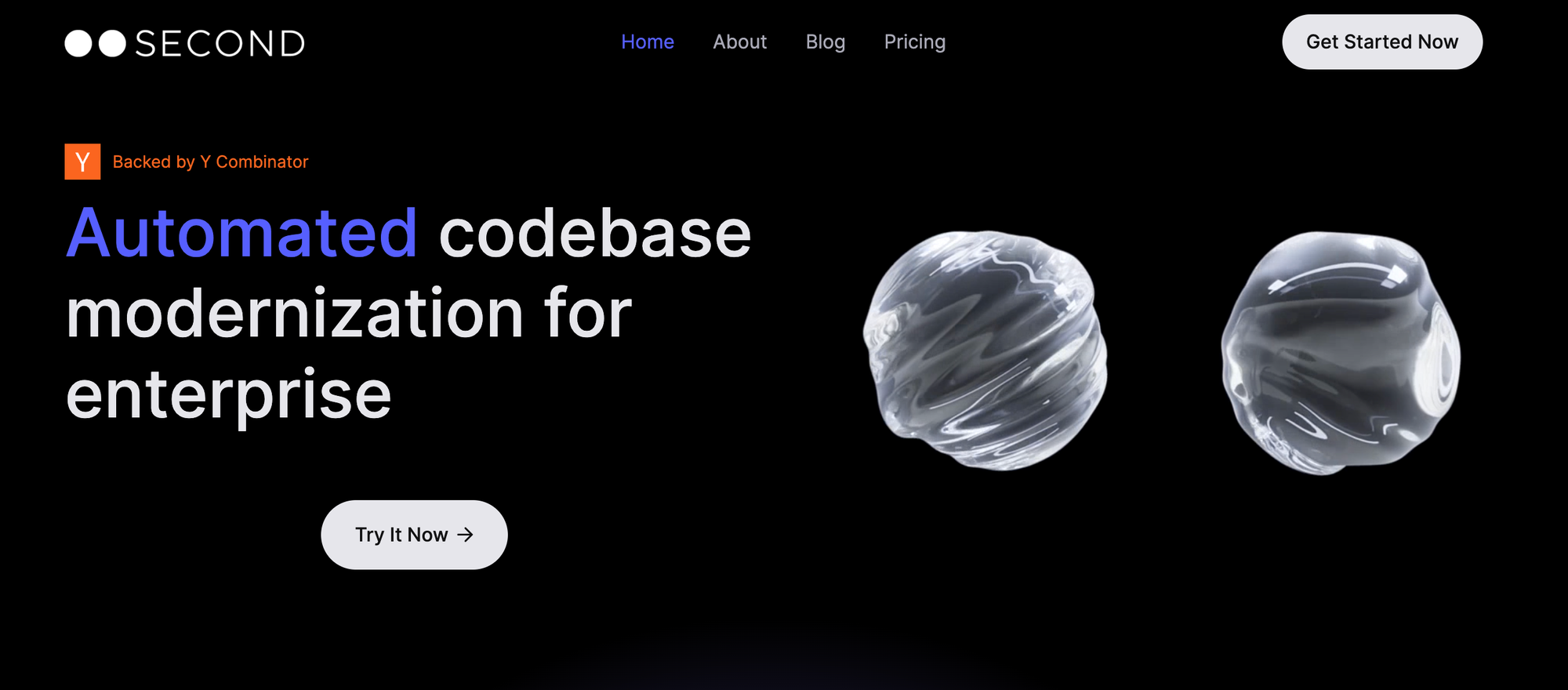
Lindy.ai
Lindy.ai is another AI agent startup that allows you to build AI employees, which they refer to as "Lindies". The platform is no-code and allows you to build agents that go beyond simple text generation tasks and are capable of performing a wide range of actions autonomously.
Key features of Lindy.ai include:
- No code agents: Users can create a Lindy in as little as 30 seconds, tailoring them to specific tasks like competitive analysis.
- Societies of Lindies: Lindies can be organized into AI teams, enhancing complex workflow management. This setup allows for specialized roles with abilities ranging from locating online documentation to writing and quality-checking code.
- Autonomous Operation with Triggers: Lindies can be activated by various triggers, like emails or webhooks, and can perform tasks independently, such as scheduling meetings or generating reports.
- Continuous Learning: Lindies learn and adapt from feedback and interactions, improving their performance over time.
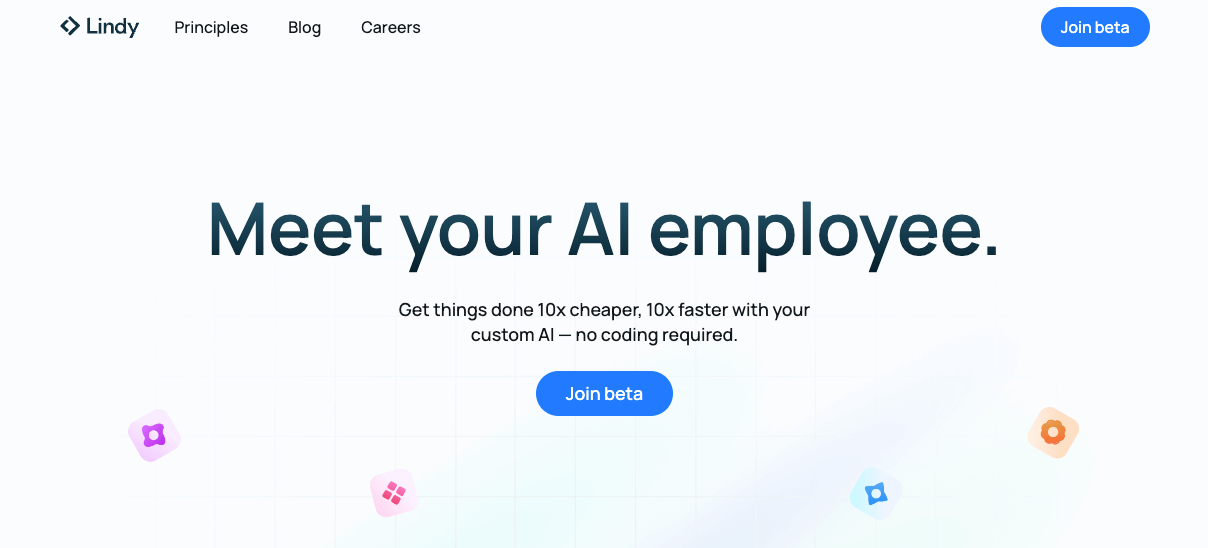
Spell.so
Spell.so is another no-code AI agent startup that allows you to create autonomous agents with web access, plugin integrations, and parallel execution. The platform is built around GPT4 and plugins, enabling it to handle a range of tasks such as stock research, competitive analysis, and more.
Key features of Spell.so include:
- No-code agents: Users can create AI agents capable of independent operation, equipped with web access and plugins to solve various tasks.
- Parallel Task Execution: The platform allows for running multiple GPT tasks simultaneously, increasing efficiency and reduces waiting times for task completion.
- Prompt Variables: Users can input ideas and data into prompts, which the AI then transforms using its capabilities.
- Curated Prompt Library: Spell.so offers a library of prompts and templates in areas like marketing, software engineering, and content creation.
- Plugin Integration: The platform includes a wide range of plugins for specific tasks like stock research, travel planning, and fitness coaching.
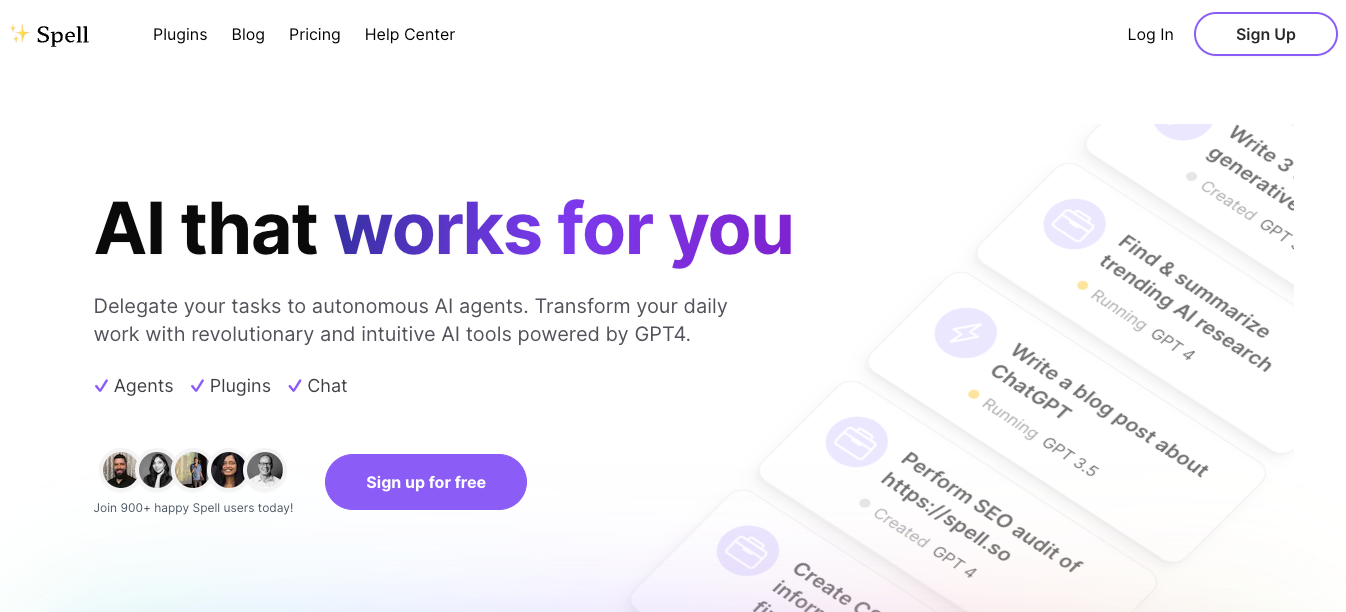
Fixie.ai
Fixie.ai is another no-code platform for building conversational AI agents, which they refer to as Sidekicks.
Key features of Fixie.ai include:
- Customized AI Agents: Known as Sidekicks, these agents are customizable and action-oriented, designed to interact with the external world, including API calls and real-time information fetching. They are grounded in the user's data, ensuring relevant and accurate responses.
- Multimodal Capabilities: Beyond text, Fixie's platform is multi-modal, capable of handling images, videos, and more. It includes a generative UI feature, allowing Sidekicks to dynamically render UI components as part of their responses, offering a comprehensive, interactive experience.
Fixie.ai raised a $17 million is seed funding round from Redpoint Ventures, Bloomberg Beta, and others.
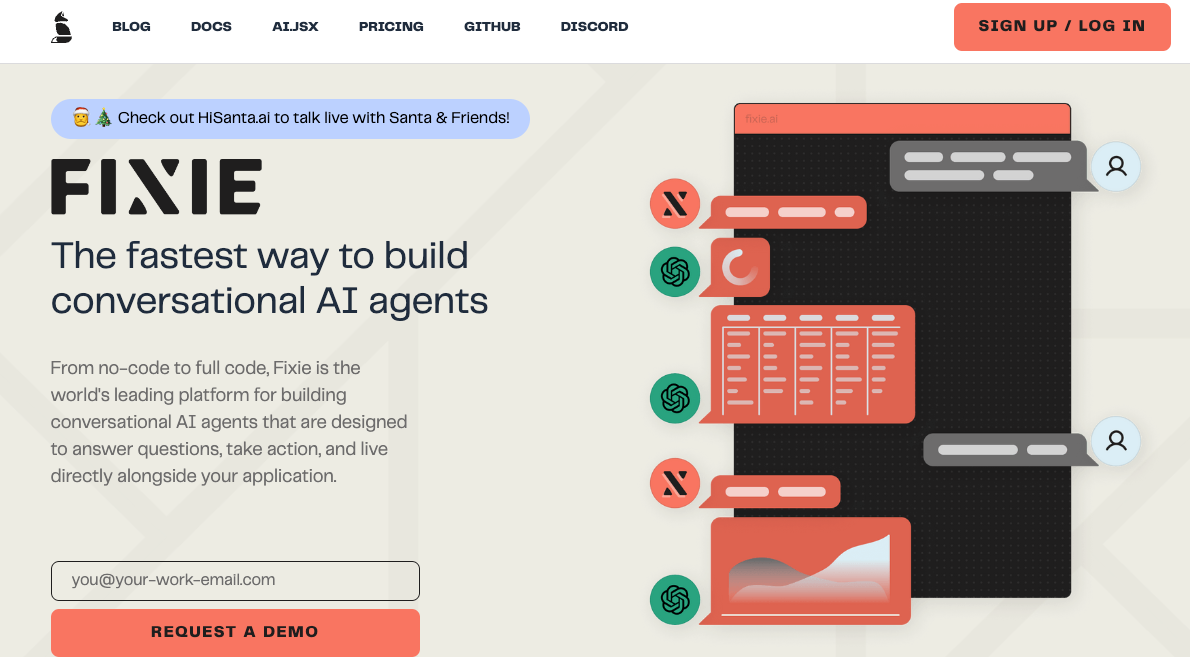
Adept
Founded in 2022, Adept is "building a machine learning model that can interact with everything on your computer".
While their platform is still in waitlist at the time of writing, their key development so far is a model called Action Transformer (ACT-1), which is:
Designed and trained specifically for taking actions on computers in response to your natural language commands.
They also recently introduced Adept Experiments to showcase their technology's enterprise applications, like automating workflows in plain language. The tool is capable of tasks such as processing emails for recruiters or handling invoices for account managers.

OpenAI
Finally, while certainly not a "startup" with their latest $100 billion valuation, OpenAI's recent release of GPT-4 Turbo and the Assistants API will likely lead to a Cambrian explosion of AI agent startups in the coming years.
As their Assistants API docs highlight:
An Assistant has instructions and can leverage models, tools, and knowledge to respond to user queries.
The Assistants API currently supports three types of tools: Code Interpreter, Retrieval, and Function calling.
We've written several tutorials about the Assistants API, which you can check out below:




That's it for this roundup of AI agent startups, if you've been using any others that you think should be included in this article, you can always contact us here.







